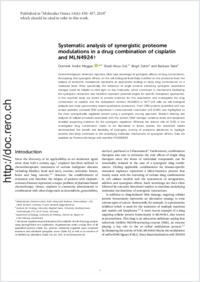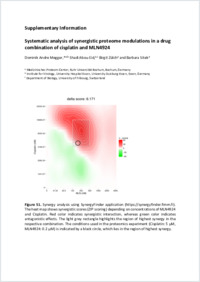Systematic analysis of synergistic proteome modulations in a drug combination of cisplatin and MLN4924
- Megger, Dominik Andre Medizinisches Proteom-Center, Ruhr-Universität Bochum, Germany - Institute for Virology, University Hospital Essen, University Duisburg-Essen, Germany
- Abou-Eid, Shadi Medizinisches Proteom-Center, Ruhr-Universität Bochum, Germany - Department of Biology, University of Fribourg, Switzerland
- Zülch, Birgit Medizinisches Proteom-Center, Ruhr-Universität Bochum, Germany
- Sitek, Barbara Medizinisches Proteom-Center, Ruhr-Universität Bochum, Germany
-
20.09.2018
Published in:
- Molecular Omics. - 2018, vol. 14, no. 6, p. 450–457
English
Chemotherapeutic treatment regimens often take advantage of synergistic effects of drug combinations. Anticipating that synergistic effects on the cell biological level likely manifest on the proteome level, the analysis of proteome modulations represents an appropriate strategy to study drug combinations on a molecular level. More specifically, the detection of single proteins exhibiting synergistic abundance changes could be helpful to shed light on key molecules, which contribute in mechanisms facilitating the synergistic interaction and therefore represent potential targets for specific therapeutic approaches. In the reported study we aimed to provide evidence for this assumption and investigated the drug combination of cisplatin and the neddylation inhibitor MLN4924 in HCT-116 cells via cell biological analyses and mass spectrometry-based quantitative proteomics. From 1789 proteins quantified with two unique peptides, activated RNA polymerase II transcriptional coactivator p15 (SUB1) was highlighted as the most synergistically regulated protein using a synergistic scoring approach. Western blotting and analyses of cellular processes associated with this protein (DNA damage, oxidative stress and apoptosis) revealed supporting evidence for the synergistic regulation. Whereas the distinct role of SUB1 in the investigated drug combination needs to be elucidated in future studies, the presented results demonstrated the benefit and feasibility of synergistic scoring of proteome alterations to highlight proteins that likely contribute to the underlying molecular mechanisms of synergistic effects. Data are available via ProteomeXchange with identifier PXD009185.
- Faculty
- Faculté des sciences et de médecine
- Department
- Département de Biologie
- Language
-
- English
- Classification
- Biological sciences
- License
-
License undefined
- Identifiers
-
- RERO DOC 323791
- DOI 10.1039/C8MO00115D
- Persistent URL
- https://folia.unifr.ch/unifr/documents/307315
Other files
Statistics
Document views: 88
File downloads:
- pdf: 184
- synergy analysis: 120
- all quantified proteins: 56
- proteins exclusively regulated upon combined treatment and calculated synergistic scores: 40
- overview of LC-MS/MS run identifiers: 40


